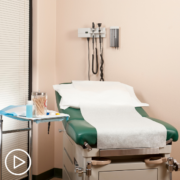Advanced Prostate Cancer Clinical Trials | Access and NRG-GU008 Trial
Advanced Prostate Cancer Clinical Trials | Access and NRG-GU008 Trial from Patient Empowerment Network on Vimeo.
What’s the latest in ongoing advanced prostate cancer clinical trials? Expert Dr. Ronald Chen from KU Medical Center discusses ongoing trials, the INNOVATE trial and NRG-GU008 trial, clinical trial benefits, and patient advice for gaining clinical trial access.
[ACT]IVATION TIP
“…ask if clinical trial is not available at your local cancer center, see if a second opinion through telehealth with a larger cancer center is possible, so that you can learn about clinical trial options and see if that’s something that you want to pursue.”
See More from [ACT]IVATED Prostate Cancer
Related Resources:

Expert Perspective | Aggressive Prostate Cancer Research and Health Equity |

Understanding the Role of a Digital Rectal Exam in Prostate Cancer Care |

|
Transcript:
Lisa Hatfield:
Dr. Chen, can you talk about any clinical trials that are ongoing for people who are living with advanced prostate cancer? And in particular, any trials that you or your colleagues are doing right now that would be of interest to this audience? And my last part to that question is, if they are not able to access those easily, do you have suggestions for patients to access those clinical trials if they’re working with a local community cancer center?
Dr. Ronald Chen:
I think having access to clinical trials is very important for every cancer patient and especially patients who have advanced cancer. And the reason I think this is really important is because in advanced cancer, we’re not doing as well as we want to in terms of extending survival and potentially even curing some patients. We’re not doing as well as we want to, and there’s a lot of room for improvement. And the only way to improve the outcomes for patients with advanced cancer is through clinical trials. Clinical trials is where patients can access first new promising treatments that are not currently available widely because it’s not yet FDA-approved.
And so, I think access to clinical trials is important and often offers a hope for patients because of a new promising agent that they could access through the trial. So I think that’s really important. And there are actually multiple…there are actually a lot of open clinical trials ongoing around the U.S. for patients with advanced cancer, testing new drugs, testing new ways to deliver treatment. I absolutely believe that there will be a new treatment approved for advanced prostate cancer probably every year for years to come because of all the new trials that are happening because of all the new promising agents that have been developed, being tested right now. So I think that’s really important.
I want to highlight a couple of examples of trials, but again, there’s so many, it’s hard to talk about all of them. But I’ll highlight a couple. There’s one trial sponsored by the National Cancer Institute for patients with no positive prostate cancer, which is when prostate cancer has spread to the lymph nodes, and the trial is called NRG-GU008, we call it the INNOVATE trial; and for patients with no positive prostate cancer, even though the cancer has spread to lymph nodes, this is actually a group of stage IV prostate cancer patients where there actually is still a hope for cure. We could actually still cure some patients with no positive prostate cancer. And the goal of this trial is to improve that cure rate.
So maybe right now, with aggressive treatment for these patients, maybe we can cure 50 percent of these patients in this trial that will incorporate a new drug that seems promising, we’re hoping that maybe improves the cure rate higher, maybe to 70 percent or higher. And so, I think that is a really important trial for patients who have that specific diagnosis.
In terms of for patients who live maybe in an area that…where the local cancer center does not offer clinical trials, I think there’s still opportunity for them to learn about clinical trials and even participate. And what I would advocate for is to ask for a second opinion.
Second opinions in cancer is now actually pretty commonly available because of the arrival of telehealth. Even if you live in maybe a small rural area, you can still request a telehealth consultation from a larger cancer center by telephone, by video, and through that, you can ask about clinical trials that are available. And I think it’s important to pursue that, to learn about the options, to learn if there’s a new treatment that could be available to you before you make a final decision on choosing treatment. So with telehealth, second opinion, learning about options, I think there’s actually opportunities to access clinical trials that way.
So my activation tip for this question is, ask if a clinical trial is not available at your local cancer center, see if a second opinion through telehealth with a larger cancer center is possible, so that you can learn about clinical trial options and see if that’s something that you want to pursue.




